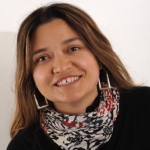A heartwarming tale
Cordoba, Argentina -- We didn't expect the story to be so big. As correspondents in Argentina, we were used to depressing news about corruption and wifebeating. But Noelia Garella's story was different. It was a happy story.
In a news agenda dominated by bloodshed and dirty politics, where was there room for that?
But the tale of Noelia, the first person with Down syndrome to become a full-fledged school teacher in Argentina, took the web by storm -- and us by surprise.
What we thought would be just a solid human interest story went viral. Her story has drawn millions of comments, "likes" and "shares" on social media, from around the world.
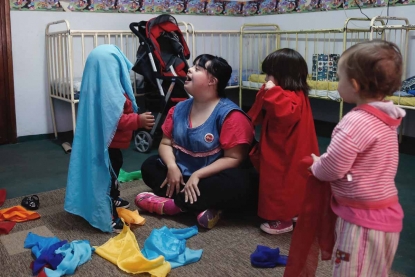 (AFP / Diego Lima)
(AFP / Diego Lima)Noelia's story began to get under our skin even before we met her, as we talked about it on the long drive down to Cordoba. Ivan, the video journalist who would be filming our report, first read of her in a local newspaper a few years back and suggested following up. Noelia’s story struck a chord, as his 10-year-old niece Maia herself had Down syndrome. Like Noelia was soon to do, the little girl had wowed Ivan with her warm and loving nature.
"Having one of these special people close to you in your life is a blessing. They appreciate things that so-called 'normal' people tend to undervalue. Every day I try to learn more from them," Ivan says. "Which of us are the handicapped ones really?"
Meanwhile Paula, the text reporter, was taken back to her childhood in Venezuela, where a boy with Down syndrome, Agustin San Blas, was in her class at the private Escuela Comunitaria primary school.
Memories of Agustin flooded back to Paula: reading aloud to him, playing in the schoolyard, trying to stop him eating too many sweets. Dancing merengue with him.
Like Noelia's own pupils, Paula and her friends learned to accept their special friend as an equal.
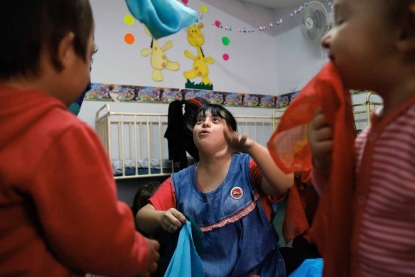 (AFP / Diego Lima)
(AFP / Diego Lima)We nearly missed out on reporting Noelia's story altogether. After driving 800 kilometers to Cordoba we were joined by local photographer Diego Lima and first reported on the canonization of Argentina’s first native saint.
Then we went to see Noelia and her family at their home. But that Wednesday, the Jeromito school where she works was closed because of a strike. We filmed her, with her smiling face and long dark hair, talking, dancing, swimming -- everything but teaching.
As Ivan and I fretted, Noelia asked her colleagues to make sure that there would be class on Friday, so that we could get the images crucial to our story. "Hey, Ivancito," she told Ivan. "tomorrow I'll ask them if we can go on Friday to Jermito and be with my little Jermitos."
The shots of Noelia reading a story to her small pupils in the classroom became the defining images of our report.
Once we had prepared the story, we faced the professional skepticism of our editors. They had tough questions about how to explain Noelia's achievement to our readers.
What teaching qualifications did Noelia have? Was she really in charge of a class by herself? What was she supposed to teach them?
Colleagues and officials in Noelia's home city had long since overcome such doubts. Noelia did not sit the same exam that most public school teachers do, and she worked accompanied by another teacher.
But when at last she took us into the classroom to watch her reading to her preschool pupils, we saw in action the charisma and warmth that made her the teacher she is.
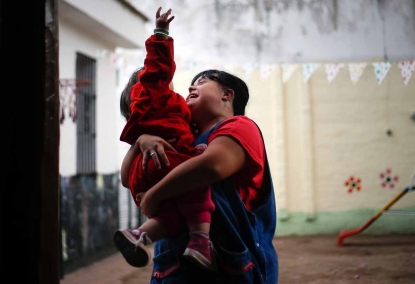 (AFP / Diego Lima)
(AFP / Diego Lima)Once the story was out on the wires and online, there began a veritable avalanche of clicks, retweets, shares and likes. Noelia herself received a message from a journalist in Thailand who had translated the story. She was invited to the launch of a Paralympic event in Bolivia. Univision invited her to a televised charity event at its Miami studios.
Online readers asked us to do more of such positive stories. Noelia's tale was a lesson in humanity, they said. One online reader on the giant US Spanish-language channel Univision thanked us "for publishing this kind of story -- yes, it is worth it."
One of the people who got in touch with Paula was Gioconda, the mother of Agustin, the little boy with Down syndrome from her primary school. She had a happy story of her own to tell -- a story a lot like Noelia's.
It turned out that Agustin ended up being the first child with Down syndrome to be accepted at a regular school in Venezuela. "There were plenty of parents who told me it was outrageous what we were doing," Gioconda said. But the openness of the school and the affection of his classmates "were a great step forward for his development." And for nearly 20 years now, Agustin has been working as a librarian at Venezuela's IVIC state research institute.
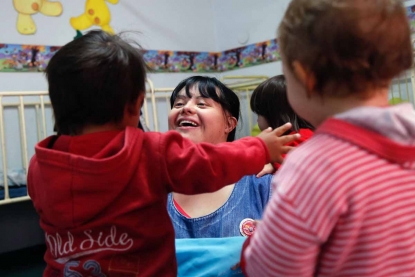 (AFP / Diego Lima)
(AFP / Diego Lima)As journalists, the success of Noelia's story made us reflect on our own work. It was a reminder never to become jaded or complacent. Extraordinary stories about ordinary people are the best stories of all. Sometimes a writer must make her readers cry -- but you can have a greater impact by making them laugh.
In a daily world news agenda dominated by negative stories, this tale of tolerance overcoming prejudice was a breath of fresh air. And like the best news stories, we realized, it taught us something about ourselves.
This blog was translated by Roland Lloyd Parry in Montevideo.
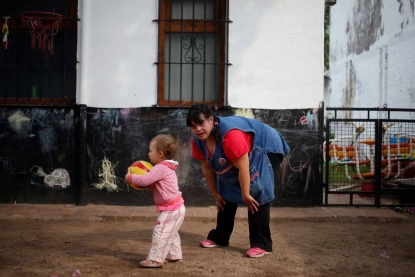 (AFP / Diego Lima)
(AFP / Diego Lima)


